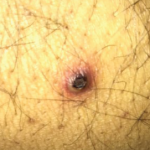NEW YORK (Reuters Health)—Anti-tumor necrosis factor (TNF) treatment is associated with a reduced risk of acute arterial events in patients with inflammatory bowel disease (IBD), especially men, new research shows.
IBD patients face an increased risk of acute arterial events, which are also independently associated with disease activity, Julien Kirchgesner, MD, PhD, of Hospital Saint-Antoine, Paris, and colleagues note in Gut, online Aug. 24.1
“Prevention of acute arterial events should be considered in the benefit-risk balance assessment of thiopurines and anti-TNFs in patients with IBD,” the team writes.
“Although [anti-TNF] agents and thiopurines may lower the risk of acute arterial events due to their anti-inflammatory properties, their impact on the risk of acute arterial events in patients with IBD is unknown,” they add.
Dr. Kirchgesner and colleagues evaluated the association between thiopurines and anti-TNFs on acute arterial events in more than 177,000 patients diagnosed with IBD using French national health insurance data. Half had Crohn’s disease and half had ulcerative colitis; 54% were female.
During follow-up, from 2010 through 2014, 4,145 acute arterial events occurred (incidence rate 5.4 per 1,000 person-years), including incident ischemic heart diseases (52%), cerebrovascular diseases (32%) and peripheral artery diseases (16%).
Exposure to anti-TNFs was associated with a significantly lower risk of arterial events (hazard ratio (HR): 0.79), while thiopurine exposure was not (HR: 0.93). Men with Crohn’s disease had the greatest reduction in risk (HR: 0.54).
The researchers say their study, “combined with the previous observations on risk of acute arterial events in patients with IBD (as compared with the general population), underscores the fact that the magnitude of risk associated with IBD and the impact of treatment should be stratified according to key parameters, such as age, sex and IBD subtype, in order to be useful for clinical decision-making.”
The study had no commercial funding. One of the authors reports financial ties to multiple drugmakers.
Dr. Kirchgesner was not available for an interview by press time.
Reference
- Kirchgesner J, Nyboe Andersen N, Carrat F, et al. Risk of acute arterial events associated with treatment of inflammatory bowel diseases: Nationwide French cohort study. Gut. 2019 Aug 24. pii: gutjnl-2019-318932. [Epub ahead of print]

